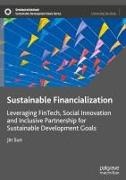Partager
Fr. 134.00
Jin Sun
Sustainable Financialization - Leveraging FinTech, Social Innovation and Inclusive Partnership for Sustainable Development Goals
Anglais · Livre Relié
Expédition généralement dans un délai de 2 à 3 semaines (titre imprimé sur commande)
Description
This book offers a groundbreaking exploration of how FinTech, social innovation, and inclusive partnerships can drive sustainable development on a global scale. It delves into the transformative potential of Alipay, the world's largest FinTech platform, and its role in achieving the United Nations' Sustainable Development Goals (SDGs) through innovative fintech solutions.
Prof. Jin Sun, Assistant Professor, The Chinese University of Hong Kong. Funded by leading grants in the US, EU, Switzerland, and Hong Kong, he published articles in the American Journal of Sociology, Annual Review of Law and Social Science, inter alia, with best article awards from the American Sociological Association and chapters at Cambridge University Press, etc.
Table des matières
Part I: Introduction.- Chapter 1: Exploring FinTech’s possibilities to achieving Sustainable Development Goals through Alipay – the world’s largest FinTech platform and its inclusive partnerships in Asia.- Part II: Sustainable Financialization for Decarbonization, Environment and Sustainability.- Chapter 2: Sustainable FinTech for public participation, low-carbon transition and environmental protection: Ant Forest in China and GForest in the Philippines.- Chapter 3: Sustainable FinTech for corporate participation and sustainable transition: InterContinental Hotels Group (IHG), Genshin Impact, McDonald and corporate partners in Alipay’s ecosystem.- Part III: Sustainable Financialization for Social Innovation, Decent Work and Inclusive Development.- Chapter 4: Sustainable FinTech for small business, developing countries and international trade: WorldFirst, Antom.- Chapter 5: Sustainable FinTech for social development: Ant Farm, Ant Foundation and local social partners for rural development, community facilities, and humanitarian aid.- Chapter 6: Sustainable FinTech for underbanked/unbanked social groups: MY bank in China, Anext Bank in Singapore, and Bettr in Thailand.- Chapter 7: Sustainable FinTech for Decent Work and Economic Growth: 10x1000 Tech for Inclusion.- Part IV: Sustainable Financialization for Inclusive Partnership and Good Governance.- Chapter 8: Sustainable FinTech for inclusive partnership: Ant Village, CyberMulan for female entrepreneurs in China and Indonesia, Wind Rider for girls' football and Blue Vest for the elderly population in China.- Chapter 9: Sustainable FinTech for data privacy governance in the Global South: Zoloz e-KYC applications from China to over ten countries in Southeast and South Asia.- Chapter 10: Sustainable FinTech for inclusive partnership and state capability building in the Global South: Paytm in India and Easypaisa in Pakistan.- Part V: Alipay+ for SDGs – Digital Infrastructure for Sustainable Tourism, Decent Work and Inclusive Development.- Chapter 11: Sustainable FinTech for state capability and inclusive tourism: cross-border payment infrastructure for 28 million international travelers via Alipay+ ecosystem in Thailand.- Chapter 12: Sustainable FinTech for inclusive tourism and economic development: Boost, MyPB, Touch ‘n Go eWallet and Alipay+ ecosystem in Malaysia.- Chapter 13: Sustainable FinTech for inclusive partnership and regional development: Akulaku PayLater, BillEase, BPI, Gcash, HelloMoney, Maya and Alipay+ ecosystem in the Philippines.- Chapter 14: Sustainable FinTech for inclusive development in the digital economy and underbanked/unbanked social groups: Doku, DANA, Akulaku PayLater, Kredivo and Alipay+ ecosystem in Indonesia.- Part VI: Sustainable Travel Program – Innovating Best Practices for Sustainable Development Goals.- Chapter 15: FinTech for sustainable travel, mega events, and best practice partners in Hong Kong and inclusive development in the Greater Bay Area (GBA).- Chapter 16: FinTech for sustainable travel, world heritage, and economic transitions for decent work and economic growth in Macau.- Chapter 17: Sustainable FinTech for sustainable tourism and Smart City in low-carbon transition: Alipay+ ecosystem in Singapore (Changi Pay, EZ-Link Wallet, ComfortDelgro, GrabPay, OCBC Digital), South Korea (Kakao Pay, NAVER Pay, Toss) and Japan (Paypay).- Part VII: Conclusion.- Chapter 18: Measurable Social Impacts of the Alipay+ for SDGs.
Détails du produit
| Auteurs | Jin Sun |
| Edition | Springer Nature Singapore |
| Langues | Anglais |
| Format d'édition | Livre Relié |
| Sortie | 01.05.2025 |
| EAN | 9789819635795 |
| ISBN | 978-981-9635-79-5 |
| Pages | 580 |
| Dimensions | 153 mm x 216 mm x 34 mm |
| Poids | 941 g |
| Catégorie |
Sciences sociales, droit, économie
> Economie
> Economie publique
|
Commentaires des clients
Aucune analyse n'a été rédigée sur cet article pour le moment. Sois le premier à donner ton avis et aide les autres utilisateurs à prendre leur décision d'achat.
Écris un commentaire
Super ou nul ? Donne ton propre avis.

